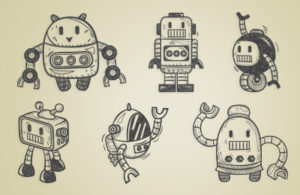Robo-sapiens – the evolution of human technology

Values build a company’s culture, not the use of sophisticated technology and automated systems, writes the chief compliance officer of Sarwa.
“The real problem is not whether machines think, but whether men do.” ― B. F. Skinner, American psychologist, author, inventor, and social philosopher.
The story of technology goes back to over 1.6 million years when our ancestors used fractured rocks as stone tools for carving and hunting. Humans have always been curious to harness the resources they have available around them and to evolve into making life as easy as possible.
It is ha rdly surprising then, that seven out of ten of the most valuable companies in the world today, by market capital, are technology companies. The future of the workforce is dominated by STEM. Schools are teaching kids as young as three years old to code – making this truly, the Age of the Digital Revolution.
rdly surprising then, that seven out of ten of the most valuable companies in the world today, by market capital, are technology companies. The future of the workforce is dominated by STEM. Schools are teaching kids as young as three years old to code – making this truly, the Age of the Digital Revolution.
While the big focus is on building a world of artificial intelligence, it’s difficult to not fall into the paranoia that soon, AI will be taking over human jobs.
So now, more than ever, we need to look towards the importance of Humanities. Start-Up companies are on the rise. For start-ups to succeed and to achieve unbelieve things, it needs remarkable leaders and remarkable people. STEM teaches us how to build things, but humanities teaches us what to build and why we need to build them.
Jack Ma, the founder of Alibaba, said at the World Economic Forum in Davos last year that we need to be teaching our children “values, believing, independent-thinking, teamwork, care for others…these are the soft parts. The knowledge will not teach you that.” He said, “That’s why I think we should teach our kids sports, music, painting, art. Everything we teach should be different from machines.”
These are the values that will build great cultures within great companies that nurture an environment for agility and speed and embracing change. There can be no replacement for the skills that differentiate themselves from a world of intuitive technology. The hard work comes from envisioning the end product, building the customer experience, that requires real world experience, judgement and historical context.
The argument that humans are complicated and difficult to manage favour the use of automated systems. However, the highest performing teams in the world share common traits that include making individual team members feel safe while motivating them to achieve the best possible results. No matter how sophisticated the system, computer programs could never replicate these traits.
One of the most iconic leaps of technology back in 1969 was when Buzz Aldrin climbed out of Apollo 11’s lunar module and descended onto the Sea of Tranquility. Armstrong and Aldrin were alone, but their presence on the moon’s surface was a result of a collective, convulsive teamwork. The world marveled in wonder at the transcend power of technology – however it was not the rocket that was acclaimed – but the people that were in it.
As society and the workplace embrace the use of AI and technology to ultimately make life simpler for us all, it is the human element that will propel humanity forward into the social evolution of the Information Age.
Columnist: Ramitha Liddington, chief compliance officer, Sarwa Digital Wealth Limited
























































































































